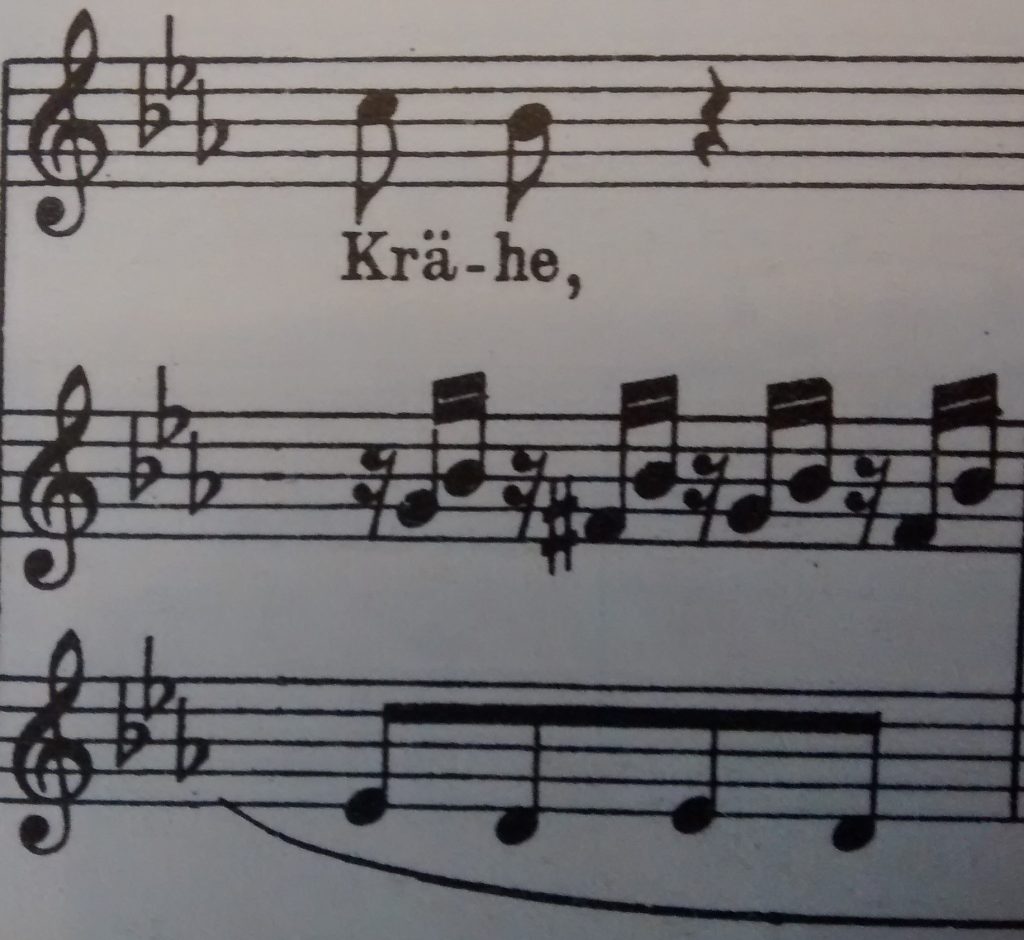Die Krähe
Eine Krähe war mit mir
Aus der Stadt gezogen,
Ist bis heute für und für
Um mein Haupt geflogen.
Krähe, wunderliches Tier,
Willst mich nicht verlassen?
Meinst wohl bald als Beute hier
Meinen Leib zu fassen?
Nun, es wird nicht weit mehr gehn
An dem Wanderstabe.
Krähe, lass mich endlich sehn
Treue bis zum Grabe!
Reflecting on this song from Winterreise, I had what I thought was a pretty good insight: namely, that even though the bird in it is a crow, you should translate “Krähe” as “raven” because they have the same number of syllables and the same vowel sounds.
In particular, it totally takes care of this measure:

“Ra-ven,” — that’s perfect.
“Anyway,” I thought, “Who can even tell the difference between a raven and crow?” And then of course I googled “raven vs. crow” and it turns out that in addition to being smaller, crows “like being in human populated areas” and are “more social and audacious” whereas ravens are aloof and cautious. Crows make that high-pitched “caw, caw” sound but ravens make a “low and hoarse” sound. And ravens (“Raben”) are mentioned elsewhere in Winterreise. Presumably the poet had his reasons for choosing one or the other.
So even though my primary motivation for translating this poem was to fit the word “raven” neatly into it, I decided to maintain the original crow. Here is a crow-based version:
As I set off through the snow
Leaving town forever
Round my head there flew a crow
And it leaves me never.
Strange bird, following my way,
Will you not depart?
Surely, you intend to prey
On my broken heart?
Not much longer now, my friend
Till my walk is over,
Crow, be with me at the end,
My one faithful lover.
But then I was out for a drink on New-Year’s-Eve Eve and thought what the heck, let’s do one with a raven too. I jotted down a first draft with a Moscow Mule (thanks go out to my drinking buddy for rhyme suggestions) and refined it this morning. Here you go:
One dark raven came with me
As I left the silent town
Still it keeps me company
Flying round and round.
Raven, strange uncanny thing,
Will you never leave me?
After all my wandering
Will your talons claim me?
Now have patience, soon I’ll lay
Down my staff with one last breath
Raven, only you will stay
Faithful unto death.
Which of my versions do you prefer – raven or crow? Or do you have a better version of your own? If so, paste it in the comments.
Incidentally, when I translate these Lieder I think more about whether they can be sung to the tune than whether they match the number of German syllables. Which means sometimes you’d be singing a one-syllable English word on two notes where the German has a different syllable on each note, and vice versa.
Song: